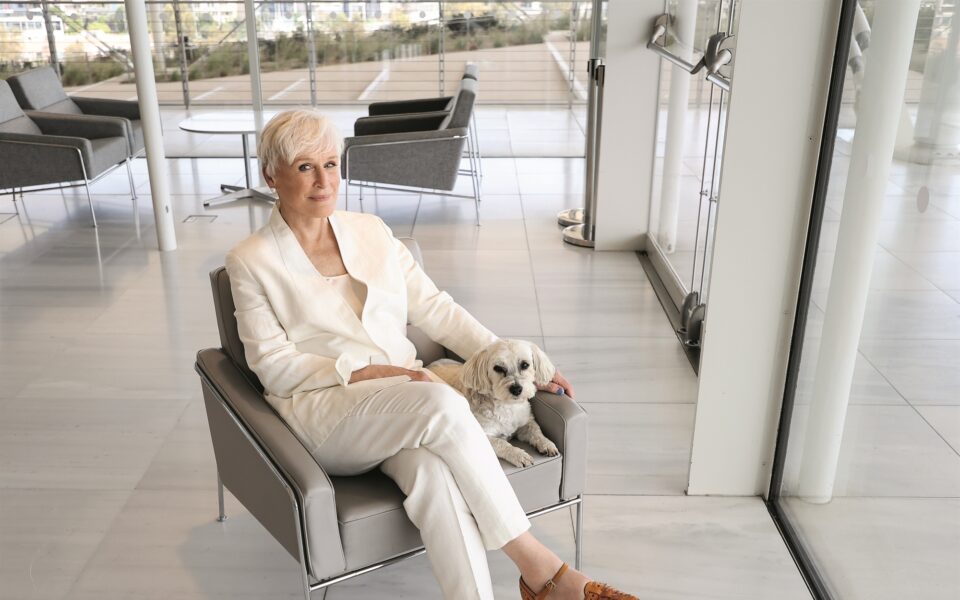Fighting the stigma of mental illness

Up close, Glenn Close exudes on the one hand the stately air of a big screen star and on the other that unique simplicity that characterizes most of her American colleagues. The award-winning actress was in Athens recently to take part in the Stavros Niarchos Foundation’s SNF Nostos conference, which this year was dedicated to mental health. In her speech to the gathering, she spoke movingly about the history of mental illness in her family, including her sister and her nephew, which motivated her to take action on the issue of mental health herself.
“I think Covid was very bad for everyone and I think that exacerbated people’s mental health state. I think it’s so evident now that we’re in a crisis state, I know in [America] suicide rates have gone up with the youth and you’d have to be an idiot not to realize that and not to want to do something about that. I know that there’s so much information and noise, let alone what’s on your phone. I think the human brain hasn’t evolved to when you can actually assimilate all that, it’s very, very difficult. In some ways it kind of shuts you down, there’s too much going on,” she told Kathimerini.
Co-founder of the nonprofit organization Bring Change to Mind, Close has ensured that some 500 student clubs have been set up in US schools to combat the stigma of mental illness.
“I think conferences are important, but I think also going into communities like we’re doing with Bring Change to Mind is probably the most important of all. I also think we have a lack of places where people can go to get help. In our community, a bunch of us had been having these big fights with the hospital to get them to have a psych ward for people who have mental health issues, because for years they would put somebody, a kid who was having a psychotic break, they would put him in handcuffs in the back of a sheriff’s car and drive him two or three hours away. I mean if everybody got together, a bunch of activists like we have in my hometown that finally, after four years, we got the hospital to say they would put 12 psych beds in. Talk about it, talk about it, talk about it, and I was very ready to, if we didn’t get that kind of movement from the hospital, I said: ‘Let’s call a community meeting, let’s put on some microphones, let’s get the people who can’t go out of town to see their child [because] it’s been taken three hours away. Let’s just do it directly.’”
When asked if she thinks the student club model can be applied to other countries like Greece, her answer is right on the money: “Of course. Has the public sector [taken action] up to now? No, because of the stigma. And that’s what we’re fighting, stigma is the most devastating aspect of mental health because it keeps people from getting help, it marginalizes people, it makes people feel ashamed and people die because of the stigma and that’s our whole thing. Talk about it, talk about it, talk about it. Make it something that is part of the human condition. It’s part of being human. I remember when I was in middle school, cancer was the big thing. I couldn’t say cancer. Nobody said cancer, and there was a time when there was a big stigma with that.”
In her own sector, however, in cinema and television, how much and in what ways are mental health issues advanced?
“A movie has to always have a protagonist and an antagonist, and it’s very, very easy to make somebody with a mental health issue into a bad person, and I think that’s been done a lot. In ‘Fatal Attraction,’ you never knew what Alex’s story was, and because you never knew what her story was, she became one of the great villains of the 20th century. In the original ending of ‘Fatal Attraction’ she killed herself, which is how that character would have ended, and I did a lot of research on that kind of thing. But they tested it, and the American audiences didn’t like the idea that the family was broken, that the protagonist went to jail. Six months after we shot it, they came back and said we’re going to reshoot it. [Alex] was a disturbed person who needed help, she wasn’t a psychopath, but they made her into a psychopath. And the movie was a huge hit, so big lesson learned.”
Fifty years on stage
As the conversation turned to the matter of roles, we asked Close how she chooses the characters she plays. “Next year will mark 50 years since I started in the theater. I still have a great interest and love for what I do but I think I now feel like I’m moving, I’m interested in really different characters and the art of changing your face. A lot of times I’ll change my face just because it distracts me, my own face […] That can work with a very fine makeup artist and wigmaker. That’s really fun, you know, to become something, it’s an art, it’s a collaboration, it’s a collaborative art,” she said.
Close’s most recent role brought her to Greece, where she filmed the second season of “Tehran,” Apple TV’s spy series where Athens doubles as the Iranian capital. “It was fabulous. They had a wonderful group,” she said of the experience of working with the Greek crew.
“When I started there was film and there was television and television was the poor cousin of film. I did television way back when and I have a huge respect for television, but then cable came out. You know the BBC’s Colin Callender came over and created HBO and that changed the whole landscape because they were more focused, the writers got more freedom. [With platforms] the very positive thing is there are so many parts for somebody like me. I mean that will extend people’s careers because there is so much need for material – hopefully, it’s good material. But the thing that I think is bad is that they want to get as many eyeballs on their product as possible, around the world, so the tendency to water everything down, so it doesn’t offend anybody and it pleases everyone. To me that’s not art, that’s just a commodity and you decide what you’re going to do with an algorithm of what that audience will be and whether you can make money off of them. And that has nothing to do with my craft.”





